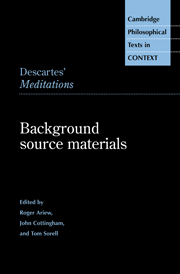Book contents
- Frontmatter
- Contents
- Preface
- Abbreviations
- General Introduction
- 1 Dialectic
- 2 That Nothing Is Known
- 3 The Promotion of Mathematics
- 4 Metaphysical Disputations
- 5 Wisdom
- 6 A Compendium of Philosophy in Four Parts
- 7 Corpus of Philosophy
- 8 The Use of Reason, The Impiety of the Deists, and The Truth of the Sciences
- 9 Unorthodox Essays against the Aristotelians
- 10 The Two Truths and The Immortality of the Soul
- 11 Dialogue on the Diversity of Religions and Little Skeptical Treatise
- 12 Universal Science
- 13 That God Exists
- Appendix: Condemnations of Cartesianism
- Bibliography
- Index
13 - That God Exists
Published online by Cambridge University Press: 05 June 2012
- Frontmatter
- Contents
- Preface
- Abbreviations
- General Introduction
- 1 Dialectic
- 2 That Nothing Is Known
- 3 The Promotion of Mathematics
- 4 Metaphysical Disputations
- 5 Wisdom
- 6 A Compendium of Philosophy in Four Parts
- 7 Corpus of Philosophy
- 8 The Use of Reason, The Impiety of the Deists, and The Truth of the Sciences
- 9 Unorthodox Essays against the Aristotelians
- 10 The Two Truths and The Immortality of the Soul
- 11 Dialogue on the Diversity of Religions and Little Skeptical Treatise
- 12 Universal Science
- 13 That God Exists
- Appendix: Condemnations of Cartesianism
- Bibliography
- Index
Summary
Introduction
Jean-Baptiste Morin (1583–1656) was professor of mathematics at the Collège de France from 1629 until his death, and his interests included physics and astronomy as well as mathematics. A year after the condemnation of Galileo by the Inquisition in 1633, he published Pro telluris quiete, defending the traditional doctrine of the immobility of the Earth. Descartes read this, and also Morin's Quod Deus sit, which appeared the following year. This short work, constructed on Euclidean principles, with Definitions, Axioms, and Theorems, illustrates a way of doing metaphysics to which many were attracted about this time; Descartes himself offered a brief example of the genre (in his Replies to the Second Set of Objections), and its most celebrated later exponent was Spinoza. The project of establishing God's existence using the kind of self-evident reasoning characteristic of geometry clearly appealed to Descartes, but he recorded his disappointment with Morin's work in a letter to Mersenne written shortly before the publication of his own Meditations:
M. Morin's main fault is that he always discusses the infinite as if he had completely mastered it and could comprehend its properties. This is an almost universal fault which I have tried carefully to avoid. I have never written about the infinite except to submit myself to it, and not to determine what it is or is not. Then, before giving any explanation of controversial points, in his sixteenth theorem, where he sets about proving that God exists, he rests his argument on his alleged refutation of the Earth's movement, and on the revolution of the whole sky around it, which he has in no way proved. […]
- Type
- Chapter
- Information
- Descartes' MeditationsBackground Source Materials, pp. 230 - 251Publisher: Cambridge University PressPrint publication year: 1998



